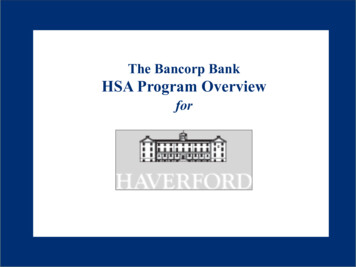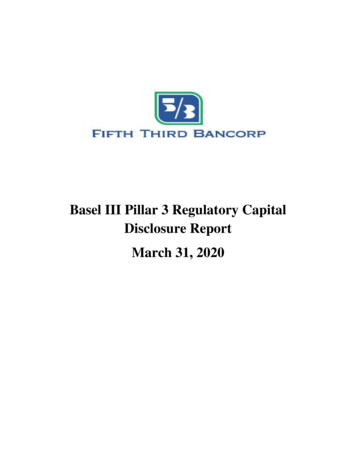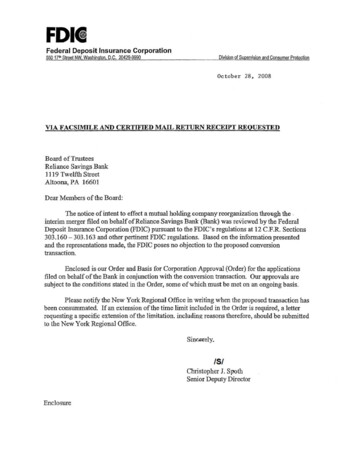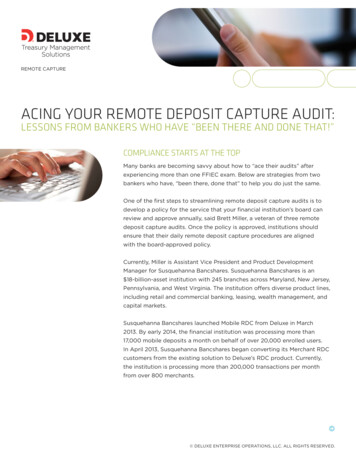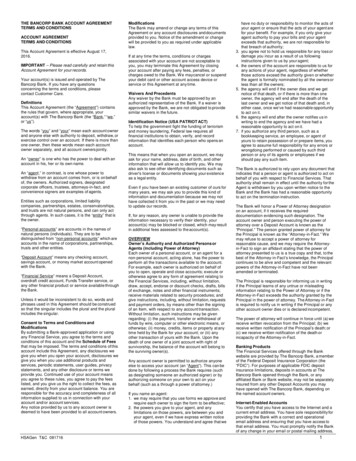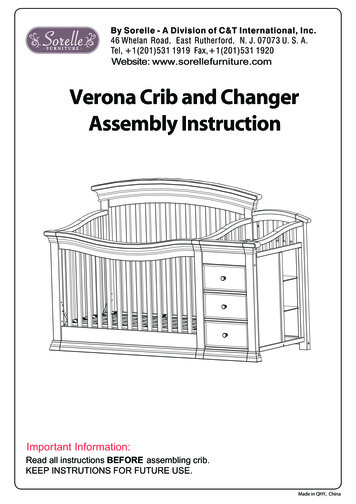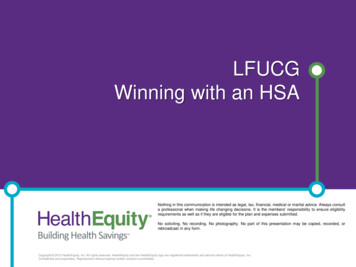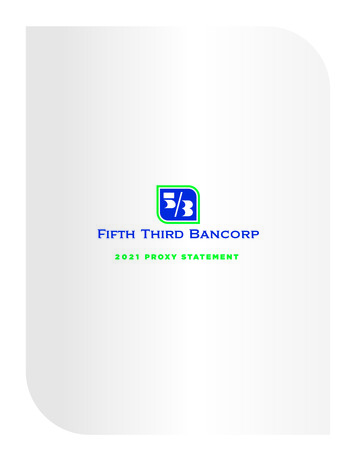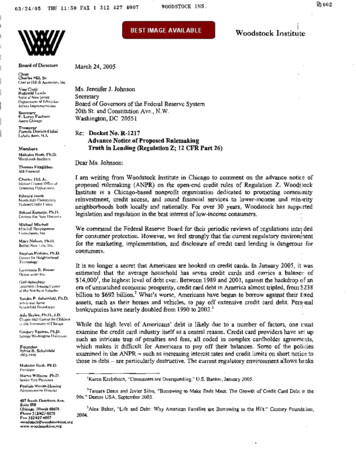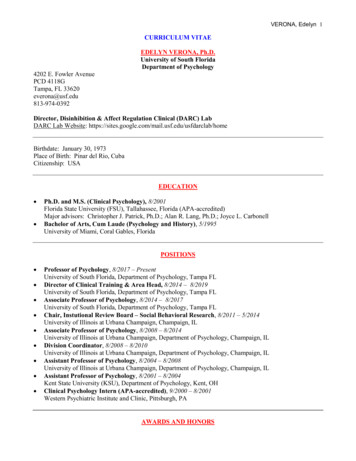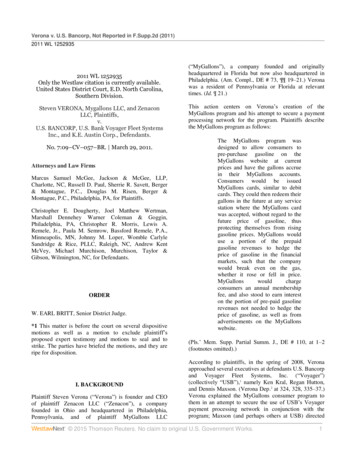
Transcription
Verona v. U.S. Bancorp, Not Reported in F.Supp.2d (2011)2011 WL 12529352011 WL 1252935Only the Westlaw citation is currently available.United States District Court, E.D. North Carolina,Southern Division.Steven VERONA, Mygallons LLC, and ZenaconLLC, Plaintiffs,v.U.S. BANCORP, U.S. Bank Voyager Fleet SystemsInc., and K.E. Austin Corp., Defendants.No. 7:09–CV–057–BR. March 29, 2011.Attorneys and Law FirmsMarcus Samuel McGee, Jackson & McGee, LLP,Charlotte, NC, Russell D. Paul, Sherrie R. Savett, Berger& Montague, P.C., Douglas M. Risen, Berger &Montague, P.C., Philadelphia, PA, for Plaintiffs.Christopher E. Dougherty, Joel Matthew Wertman,Marshall Dennehey Warner Coleman & Goggin,Philadelphia, PA, Christopher R. Morris, Lewis A.Remele, Jr., Paula M. Semrow, Bassford Remele, P.A.,Minneapolis, MN, Johnny M. Loper, Womble CarlyleSandridge & Rice, PLLC, Raleigh, NC, Andrew KentMcVey, Michael Murchison, Murchison, Taylor &Gibson, Wilmington, NC, for Defendants.ORDERW. EARL BRITT, Senior District Judge.*1 This matter is before the court on several dispositivemotions as well as a motion to exclude plaintiff’sproposed expert testimony and motions to seal and tostrike. The parties have briefed the motions, and they areripe for disposition.I. BACKGROUNDPlaintiff Steven Verona (“Verona”) is founder and CEOof plaintiff Zenacon LLC (“Zenacon”), a companyfounded in Ohio and headquartered in Philadelphia,Pennsylvania, and of plaintiff MyGallons LLC(“MyGallons”), a company founded and originallyheadquartered in Florida but now also headquartered inPhiladelphia. (Am. Compl., DE # 73, ¶¶ 19–21.) Veronawas a resident of Pennsylvania or Florida at relevanttimes. (Id. ¶ 21.)This action centers on Verona’s creation of theMyGallons program and his attempt to secure a paymentprocessing network for the program. Plaintiffs describethe MyGallons program as follows:The MyGallons program wasdesigned to allow consumers topre-purchase gasoline on theMyGallons website at currentprices and have the gallons accruein their MyGallons accounts.Consumers would be issuedMyGallons cards, similar to debitcards. They could then redeem theirgallons in the future at any servicestation where the MyGallons cardwas accepted, without regard to thefuture price of gasoline, thusprotecting themselves from risinggasoline prices. MyGallons woulduse a portion of the prepaidgasoline revenues to hedge theprice of gasoline in the financialmarkets, such that the companywould break even on the gas,whether it rose or fell in price.MyGallonswouldchargeconsumers an annual membershipfee, and also stood to earn intereston the portion of pre-paid gasolinerevenues not needed to hedge theprice of gasoline, as well as fromadvertisements on the MyGallonswebsite.(Pls.’ Mem. Supp. Partial Summ. J., DE # 110, at 1–2(footnotes omitted).)According to plaintiffs, in the spring of 2008, Veronaapproached several executives at defendants U.S. Bancorpand Voyager Fleet Systems, Inc. (“Voyager”)(collectively “USB”),1 namely Ken Kral, Regan Hutton,and Dennis Maxson. (Verona Dep.2 at 324, 328, 335–37.)Verona explained the MyGallons consumer program tothem in an attempt to secure the use of USB’s Voyagerpayment processing network in conjunction with theprogram; Maxson (and perhaps others at USB) directed 2015 Thomson Reuters. No claim to original U.S. Government Works.1
Verona v. U.S. Bancorp, Not Reported in F.Supp.2d (2011)2011 WL 1252935Verona to work with defendant K.E. Austin Corp.(“GoGas”), represented to be a “reselling agent” of theVoyager network, as USB would not work directly withthe program until it reached a certain size. (Id. at 90, 134,322–32, 329, 344–45.)GoGas is a North Carolina corporation headquartered inWilmington, North Carolina. (Dorroll Aff., DE # 132, ¶2.) As USB directed, Verona called GoGas, speaking withPhil Dorroll, the company’s national fleet director.(Verona Dep. at 95, 133.) Verona explained to Dorrollthat persons at USB told him to work with him (Dorroll),and they discussed the MyGallons program, specificallythat it was a consumer program. (Id. at 95, 134.)Dorrolldirected him to GoGas’s website for a fleet cardapplication. (Id . at 90, 95.)The parties agree that Veronacompleted a fleet card application in the name of Zenaconon GoGas’s website. (Garzione Aff., DE # 133, ¶ 4 & Ex.3.) Kat Garzione at GoGas verbally assisted Verona withcompletion of the application, including filling inprojected, rather than actual, annual sales and total assetsbecause the program was a “start-up.” (Verona Dep. at128–30.) Defendants deny that any of these conversationsbetween Verona and USB executives and GoGasemployees occurred. (See Kral Dep., DE # 88–1, at 49;Hutton Dep., DE # 88–4, at 24–25; Dorroll Aff., DE #132, ¶¶ 8, 11, 13; Garzione Aff., DE # 133, ¶ 7; MaxsonDecl., DE # 139.)*2 On 17 March 2008, Verona faxed the signed fleet cardapplication in the name of Zenacon to GoGas. (SeeGarzione Aff., DE # 133, ¶ 6 & Ex. 3.) The parties agreethat GoGas forwarded the application to USB, and USBapproved the application, with a relatively small creditlimit. (See id. ¶ 10; Pls.’ Ex. 27, DE # 109–5.) In April2008, fleet fuel cards in the name of “MyGallons.com”were issued to Verona. (Garzione Aff., DE # 133, ¶¶ 10,13.) Fleet fuel cards such as those issued to Verona enablethe card holders to purchase gasoline at stations whichaccept the Voyager card; payment to the gasoline stationis settled (i.e., processed) through the Voyager networkand GoGas provides the fleet customer with day to daycustomer support. (Dorroll Aff., DE # 132, ¶ 5.) Plaintiffscharacterize the MyGallons.com cards as having beenissued as part of a “pilot program” to ensure theMyGallons program would work administratively asintended. (See Verona Dep. at 106–08.) Veronadistributed the cards to a handful of friends and family,who apparently used them at Voyager-approved gasolinestations, as GoGas sent “MYGALLONS.COM” invoicesfor the purchases. (Id. at 106;see also Pls.’ Exs. 32–35,DE # # 101–2 to [MyGallons]—specifically branded to handlethe MyGllons program, as Zenacon, the predecessorentity, was an existing company with various otherventures.”(Pls.’ Mem. Supp. Partial Summ. J., DE # 110,at 6–7.) MyGallons filed its articles of incorporation inFlorida on 14 April 2008. (Defs.’ Ex. 27, DE # 89–4.)Verona intended to “transition” the fleet account fromZenacon to the newly formed entity MyGallons. (SeeVerona Dep. at 140, 167–68, 170.) On 20 May 2008,Verona submitted via fax a second fleet card applicationto GoGas, this application being in the name ofMyGallons. (Verona Dep. at 172, 174; Pls.’ Ex. 36, DE #101–6; see also Pls.’ Ex. 37, DE # 101–7 (5/7/08 emailfrom Verona to GoGas stating, “I will submit an app [sic]to change to MyGallons LLC once I get settled in FL. Iexpect to be there within 2 weeks .”).) GoGas denies everhaving received this application or forwarding it to USBfor credit approval. (Dorroll Aff., DE # 132, ¶¶ 16, 17;Garzione Aff., DE # 133, ¶ 27.) According to GoGas, thefleet account at all times was considered to be in the nameof MyGallons.com, a d/b/a of Zenacon. (Garzione Aff.,DE # 133, ¶ 22.)In the meantime, there were a number of communicationsbetween Verona and GoGas employees about testing ofthe MyGallons program; implementation of the “full”program, including whether USB would require collateral,the billing cycle, the transmission of data directly betweenMyGallons and USB servers; and logistical issues, suchas billing, ordering of cards, card design, and use of theVoyager logo. (Verona Dep. at 131–32, 135–45, 149–50.)During some of these communications, GoGas employeesrepresented that USB had approved or authorized certainthings. (Id. at 132, 142–43, 145, 236–37, 361.)Althoughthere is one communication directly between Verona anda USB employee, (see Pls.’ Ex. 51, DE # 101–19(regarding the transmission of data between MyGallonsand USB servers)), it is apparent that Verona dealtprimarily with GoGas and GoGas in turn communicatedwith USB.*3 Verona, on behalf of MyGallons, entered into twoadditional agreements with GoGas: (1) a 10/11 June 2008confidentiality agreement, (Pls.’ Ex. 53, DE # 101–21;Dorroll Aff., DE # 132, ¶ 27), and (2) a 27 June 2008rebate agreement, (Pls.’ Ex. 54, DE # 101–22; DorrollAff., DE # 132, ¶ 43). All defendants contend that USBwas in the process of drafting a separate, direct agreementbetween USB and MyGallons for use of the Voyagerpayment processing network (separate and apart fromGoGas) and that Verona and/or his attorney were awareof that fact. (See Loveridge Dep., DE # 88–2, at 138–43;Dorroll Dep., DE # 87–6, at 168; Dorroll Aff., DE # 132,¶¶ 25, 30, 37, 42 & Exs. 18, 23, 33, 34, 38.) 2015 Thomson Reuters. No claim to original U.S. Government Works.2
Verona v. U.S. Bancorp, Not Reported in F.Supp.2d (2011)2011 WL 1252935As the court understands it, plaintiffs’ theory is that nodirect agreement between USB and MyGallons wasneeded because of the existence of the 17 March 2008Zenacon contract, the purported contract created by virtueof the 20 May 2008 MyGallons fleet card application, theconfidentiality agreement, and the rebate agreement. Assupport for this theory, plaintiffs rely on the actions ofUSB and GoGas prior to 1 July 2008 which purportedlyindicate the parties were moving forward with theMyGallons program, (Verona Dep. at 168, 174; see alsoLoveridge Dep., DE # 88–2, at 144 (the workingrelationship between Voyager and Zenacon or MyGallonscontinued while the partner agreement was being drafted);Dorroll Dep., DE # 87–6, at 167–68 (no one at Voyagerasked Dorroll to halt the relationship with or ceaseworking with MyGallons; he did not stop communicatingwith Verona while the partner agreement was beingdrafted)); and, the failure of anyone to communicate toVerona that a direct agreement with USB was required,(see Loveridge Dep. at 143, DE # 88–2 (no knowledge ofanyone at Voyager speaking with anyone at Zenacon orMyGallons regarding drafting of an agreement); DorrollDep., DE # 87–6 at 168 (no one at Voyager evercommunicated to Verona that a partner agreement wasbeing drafted)).On 30 June 2008, Verona issued a press releaseannouncing the launch of the MyGallons program. (Pls.’Ex. 57, DE # 101–25.) The press release stated that “thegas redemption program uses the Voyager fleet network”and described the program as a consumer-basedmembership program. (Id.) According to plaintiffs, 6,000consumers entered into contractual relationships withMyGallons following the launch (i.e., became members).(Pls.’ Mem. Supp. Partial Summ. J., DE # 110, at 27; seealso Verona Dep. at 146.) Media interest also ensued.(See Pls.’ Exs. 12–15, DE # # 97–8 to 97–11.)According to USB, it did not become aware of theconsumer, rather than commercial, nature of theMyGallons program until learning of the press release.(Kral Dep., DE # 88–1, at 135–37; Loveridge Dep., DE #88–2, at 95–96.) On 1 July 2008, USB’s counsel emailedVerona, stating in relevant part,This communication is to inform you that there is noagreement in place between MyGallons and U.S. Bankor Voyager for such a program as described on theMyGallons website. MyGallons had not communicatedto Voyager that any potential program betweenMyGallons and Voyager was or is for consumer use.MyGallons also has no approval from U.S. Bank orVoyager to use Voyager’s marks, or to issue a pressrelease naming either U.S. Bank or Voyager.*4 U.S. Bank therefore demands that you immediatelyremove all references to Voyager and U.S. Bank,including any trademarks or symbols, from MyGallons’website, as well as any future MyGallons statements orpress releases. U.S. Bank further informs MyGallonsthat neither U.S. Bank nor Voyager will enter into anyagreement with MyGallons as contemplated anddescribed on MyGallons’ website.We also understand you executed, as the president andchairman of a company called Zenacon, LLC, a GoGasCommercial Fleet Card application and agreement inApril, 2008 (the “Agreement”). We further understandthat Zenacon may be issuing cards to consumers, undera similar model to the program described on theMyGallons website. This constitutes an unauthorizeduse of commercial fleet cards, and a breach of the termsand conditions set forth in the Commercial Fleet Card.We are terminating this Agreement immediately.(Defs.’ Ex. 88, DE # 91–3.)In a conference call later in the day on 1 July 2008, theparties discussed USB’s inability to participate in aconsumer-based program and the possibility of a futurecontract between the parties. (See Kral Dep., DE # 88–1,at 136–40, 153, 170–73.) In the following days, USBissued several statements to the press and the BetterBusiness Bureau (“BBB”) regarding its businessrelationship (or lack thereof) with MyGallons andZenacon. (See Defs.’ Exs. 89–91, DE # # 91–4 to 91–6.)Thereafter, the BBB assigned MyGallons an “F” rating,news of which the BBB disseminated widely. (See Pls.’Exs. 78, 79, DE # # 106–18, 106–19.) According toplaintiffs, MyGallons incurred PR costs and expenses inattempting to correct the information disseminated, and itwas forced to respond to subpoenas and/or inquiries fromAttorneys General of several states, among other things.(Am. Compl., DE # 73, ¶ 104.)On 7 July 2008, GoGas authorized Verona to use thefollowing statement:GoGas had agreements in place with Zenacon LLC andMyGallons LLC in order to provide support for theMyGallons program through the use of the Voyagerpayment processing network. We believe theMyGallons program is an innovative business and itcould offer Americans relief at the pump. We werevery excited that Steven Verona and his staff havedeveloped a program that can help the American publicand to give them a tool to manage their personal budgetgiven the constant increase in prices at the pump. Wewish MyGallons and their members all the best as theymove forward with another payment network. We feel 2015 Thomson Reuters. No claim to original U.S. Government Works.3
Verona v. U.S. Bancorp, Not Reported in F.Supp.2d (2011)2011 WL 1252935certain there are other networks able to support theirneeds.II. CROSS–MOTIONS FOR SUMMARYJUDGMENT“We believe Steven Verona to be a man of integrityand honesty based on our dealings with him. In fact wetruly enjoyed working with Steven and his staff.”Weare sorry that MyGallons and their launch have beenharmed by the release of incorrect information andconfusing statements resulting in negative press.GOGAS apologizes for any actions that may haveresulted in any release of this incorrect information.MyGallons should be applauded for their ability todevelop a program that is so positive for Americandrivers.”Plaintiffs move for summary judgment as to liability onall claims except promissory estoppel and publicityplacing persons in a false light. Defendants move forsummary judgment on all of plaintiffs’ claims. Summaryjudgment is appropriate “if the movant shows that there isno genuine dispute as to any material fact and the movantis entitled to judgment as a matter of law.”Fed.R.Civ.P.56(a).“[T]he substantive law will identify which facts arematerial. Only disputes over facts that might affect theoutcome of the suit under the governing law will properlypreclude the entry of summary judgment.”Anderson v.Liberty Lobby, Inc., 477 U.S. 242, 248 (1986).“Thesummary judgment inquiry . scrutinizes the plaintiff’scase to determine whether the plaintiff has profferedsufficient proof, in the form of admissible evidence, thatcould carry the burden of proof of his claim at trial.”Mitchell v. Data Gen. Corp., 12 F.3d 1310, 1316 (4thCir.1993). In evaluating a motion for summary judgment,facts and inferences must be viewed in the light mostfavorable to the non-movant. Anderson, 477 U.S. at 255.*5 (Pls.’ Ex. 40, DE # 101–10.) According to plaintiffs,this statement was not widely disseminated. (Pls.’ Mem.Supp. Partial Summ. J., DE # 110, at 22.)Plaintiffs claim that because MyGallons did not haveaccess to the Voyager payment processing network andcould not secure an alternative network, MyGallonsissued refunds to over 6,000 customers and lost anadditional 25,000–30,000 prospective customers (i.e.,those persons who had submitted their names and contactinformation to MyGallons and requested notification ofwhen they could become members).(Id. at 27;see alsoVerona Dep. at 146.) Although one or more of theplaintiffs apparently incurred out of pocket expenses,plaintiffs primarily claim future lost profits as a result ofdefendants’ actions.Plaintiffs initially filed this action on 22 August 2008 inthe Eastern District of Pennsylvania. Upon GoGas’smotion to dismiss for lack of personal jurisdiction, thatcourt transferred the case to this court on 24 February2009. With leave of court, plaintiffs filed an amendedcomplaint on 4 December 2009, alleging claims for (1)breach of contract, (2) promissory estoppel, (3) tortiousinterference with contractual relations, (4) tortiousinterference with prospective contractual relations, (5)defamation, (6) disparagement/injurious falsehood, (7)publicly placing persons in a false light, and (8) violationof North Carolina’s Unfair and Deceptive Trade PracticesAct. On 4 January 2010, Voyager filed a counterclaimagainst MyGallons and Verona alleging defamation, and acounterclaim against Zenacon and Verona alleging breachof contract for failure to pay 1,486.84 in charges on gascards. The parties have filed cross-motions for summaryjudgment. Defendants filed a joint motion to excludeplaintiffs’ proposed expert witnesses on damages. Finally,the parties filed motions to seal and related motions tostrike.A. Breach of Contract*6 The terms and conditions of the 17 March 2008Zenacon contract (and the 20 May 2008 MyGallonscontract, if there was one) include a choice of lawprovision: “The validity, interpretation and performanceof this Agreement will be controlled by and construedunder the laws of the State of North Dakota (withoutgiving effect to the conflict of law principles thereof) andapplicable federal laws.”3(Defs.’ Ex. 23, DE # 88–16.)Under North Dakota law, “the prima facie elements of abreach of contract action are the existence of a contract, abreach of the contract, and damages flowing from thebreach of contract.”Abdullah v. North Dakota, 771N.W.2d 246, 253 (N.D.2009).Defendants vigorously deny the existence of any contractwith MyGallons and deny any breach of the contract withZenacon. The factual disputes underlying these issues arenumerous. Key among them are: whether anyone at USBdirected Verona to GoGas; whether anyone at USB madeany representations to Verona about GoGas’s authorityregarding the use of the Voyager network; whatrepresentations GoGas employees made to Verona;whether the Zenacon contract was transitioned to acontract with MyGallons; whether Verona submitted afleet card application in the name of MyGallons; whetherany defendant acted in furtherance of an agreement withMyGallons; the extent of USB’s knowledge about theMyGallons program; whether anyone acting on behalf of 2015 Thomson Reuters. No claim to original U.S. Government Works.4
Verona v. U.S. Bancorp, Not Reported in F.Supp.2d (2011)2011 WL 1252935Zenacon or MyGallons knew USB was drafting a directagreement between USB and MyGallons; and whetherGoGas caused any damages to any plaintiff based onMyGallons’s inability to use the Voyager network. Withthe existence of these material factual disputes, the courtcannot grant summary judgment in favor of any party,unless a purely legal basis exists to grant judgment infavor of a party.In this vein, defendants contend that the statute of fraudsbars plaintiffs’ breach of contract claim. Specifically,defendants argue that although the 17 March 2008Zenacon contract clearly satisfies the statute of frauds,there is no written agreement to support the MyGallonsprogram. (USB’s Mem. Supp. Summ. J., DE # 86, at 15;GoGas’s Mem. Supp. Summ. J., DE # 99, at 14.)Defendants rely on two provisions of North Dakota’sstatute of frauds, codified at N . D. Cent.Code §9–06–04(1) and (4). The referenced provisions requirecertain contracts to be in writing: “[a]n agreement that byits terms is not to be performed within a year from themaking thereof” and “[a]n agreement or promise for thelending of money or the extension of credit in anaggregate amount of twenty-five thousand dollars orgreater.”N.D. Cent.Code § 9–06–04(1), (4). The courtagrees with plaintiffs that because any purported oralagreement could conceivably be performed within oneyear, N.D. Cent.Code § 9–06–04(1) does not bar itsenforcement. See Delzer v. United Bank of Bismark, 459N.W.2d 752, 754 (N.D.1990) (“ ‘[i]f there is anypossibility that an oral contract is capable of beingcompleted within one year, the contract is not within thestatute of frauds even though it is clear that the partiesmay have intended and thought it probable that thecontract would extend over a longer period, and eventhough the contract does so extend.’Thus, the contractmust be impossible to perform within one year if it is tobe proscribed by the statute.”(citation omitted) (alterationand emphasis in original)).*7 Addressing defendants’ argument that § 9–06–04(4)also bars enforcement of any oral agreement pertaining tothe MyGallons program, plaintiffs assert that the parties’agreement did not involve a loan or extension of credit.According to plaintiffs, the parties agreed that theMyGallons account was to be prepaid, meaning thatMyGallons would have on deposit at USB an amountequal to fleet fuel transactions during a set billing cycle,and thus, USB would not be loaning MyGallons anyfunds or otherwise extending any credit. (Pls.’ Resp.USB’s Mot., DE # 144, at 9; Verona Dep. at 142–45,233–37.) If one believes this version of events, then thepurported oral agreement is not subject to the statute offrauds in N.D. Cent.Code. § 9–06–04(4).More important, however, is plaintiffs’ contention that the20 May 2008 fleet card application in the name ofMyGallons is the operative agreement between theparties. If one believes plaintiffs’ version of the facts, thenobviously the 20 May 2008 agreement is written, and thestatute of frauds is satisfied. For these reasons, the courtcannot grant summary judgment on plaintiffs’ breach ofcontract claim on the basis of the statute of frauds.In addition to the statute of frauds, USB claims it couldnot have entered into an agreement with MyGallons dueto the program’s incompatibility with Voyager’s businessmodel and due to the fact the program may violate theCommodity Exchange Act. (USB’s Mem. Supp. Summ.J., DE # 86, at 17–18.) To be sure, an illegal contract,whether written or oral, is unenforceable. See Kolb v.Schatzman & Assocs., L.L.C., 563 S.E.2d 231, 235(N.C.Ct.App.2002) ( “ ‘Generally, contracts which areillegal are unenforceable.’ “ (citation omitted)); Meyer v.Hawkinson, 626 N.W.2d 262, 267 (N.D.2001) (“ThisCourt will not enforce contracts which have an unlawfulpurpose .“ (citations omitted)). However, that Voyagerrestricts its lending to the commercial setting so as toavoid having to comply with disclosures required forconsumer lending or that it may have believed that theMyGallons program would not be permitted by the U.S.Commodities Futures Trading Commission and thatconsumer class action lawsuits would ensue, (USB’sMem. Supp. Summ. J., DE # 86, at 17–19), does not makethe purported MyGallons agreement illegal and thereforeunenforceable. If anything, such grounds bolster USB’sposition that it never entered into an agreement withMyGallons, but ultimately that issue is one the jury mustdecide.Finally, with regard to plaintiffs’ breach of contract claim,the court agrees with USB that its liability, if any, cannotbe based on breach of the rebate or confidentialityagreements. GoGas and MyGallons are the only parties tothose agreements. At any rate, plaintiffs’ position is thatUSB breached only the 17 March 2008 Zenacon contractand the 20 May 2008 MyGallons contract, (see Pls.’ Resp.USB’s Mot., DE # 144, at 4–6; Pls.’ Reply to USB’sResp., DE # 147, at 2); plaintiffs do not contend thatGoGas was acting as USB’s “reselling agent” whenGoGas entered into these agreements with MyGallons.Finally, the court agrees that Verona as an individual doesnot have any breach of contract claim independent ofeither Zenacon or MyGallons, as he executed anycontracts as an officer of behalf of those entities, and tothe extent he alleges such claim, it must be dismissed. 2015 Thomson Reuters. No claim to original U.S. Government Works.5
Verona v. U.S. Bancorp, Not Reported in F.Supp.2d (2011)2011 WL 1252935B. Promissory Estoppel*8 The parties agree that North Dakota law governsplaintiffs’ promissory estoppel claim. (See Pls.’ Resp.GoGas’s Mot., DE # 145, at 13 n. 20; GoGas’s Mem.Supp. Summ. J., DE # 99, at 20; USB’s Mem. Supp.Summ. J., DE # 86, at 20–21 & n. 9.)In order to invoke the doctrine of promissory estoppel,the following four elements must be established: “1) apromise which the promisor should reasonably expectwill cause the promisee to change his position; 2) asubstantial change of the promisee’s position throughaction, or forbearance; 3) justifiable reliance on thepromise; and 4) injustice which can only be avoided byenforcing the promise.”.The terms of the promise, under the doctrine ofpromissory estoppel, must be clear, definite, andunambiguous. “Unsupported conclusory allegations areinsufficient to withstand summary judgment.”County 20 Storage & Transfer Inc. v. Wells Fargo Bank,NA, No. 3:09–cv–104, 2011 WL 826349, at *3–4 (D.N.D.March 3, 2011) (citations omitted). The same disputedissues of material fact regarding plaintiffs’ alternativeclaim for breach of contract exist for the promissoryestoppel claim. The only issue which can be resolved onsummary judgment is whether Verona has a promissoryestoppel claim independent of Zenacon and MyGallons.As with the breach of contract claim, he does not, and tothe extent he alleges such a claim, it will be dismissed.C. Tortious Interference with Contract andProspective AdvantagePlaintiffs allege that (1) USB interfered with MyGallons’scontracts with GoGas; (2) all defendants interfered withMyGallons’s contracts with 6,000 customers; and, (3) alldefendants interfered with MyGallon’s prospectivecontracts with 25,000–30,000 potential customers. (Am.Compl., DE # 73, at 35–37; Pls.’ Mem. Supp. PartialSumm. J., DE # 110, at 26–27.) Thus, plaintiffs assertclaims for tortious interference with contract and fortortious interference with prospective advantage.The elements of a prima facie case of tortious interferencewith contract are:(1) a valid contract between theplaintiff and a third person whichconfers upon the plaintiff acontractual right against a thirdperson; (2) the defendant knows ofthe contract; (3) the defendantintentionally induces the thirdperson not to perform the contract;(4) and in doing so acts withoutjustification; (5) resulting in actualdamage to plaintiff.Holleman v. Aiken, 668 S.E.2d 579, 589–90(N.C.Ct.App.2008) (quotation and citation omitted).4“Theonly difference in these elements for a tortiousinterference with prospective economic advantage claimis that instead of an existing contract, there must be acontract that would have been entered into but for thedefendant’s conduct.”National Welders Supply Co. v.Roberts Oxygen Co., No. 3:07–CV–350, 2008 WL1837251, *1 (W.D.N.C. April 22, 2008) (citing Beck v.City of Durham, 573 S.E.2d 183, 191 (N .C.Ct.App.2002)).*9 The court examines first plaintiffs’ claim that USBinterfered with MyGallons’s contracts with GoGas.According to plaintiffs, USB interfered with threedifferent agreements between MyGallons and GoGas: (1)the 20 May 2008 agreement for MyGallons’s use of theVoyager network, (2) the 10/11 June 2008 confidentialityagreement, and (3) the 27 June 2008 rebate agreement.(Am. Compl., DE # 73, ¶¶ 123, 136; Pls.’ Mem. Supp.Partial Summ. J., DE # 110, at 26.) With respect to thefirst agreement, the parties’ dispute centers on whether avalid contract even existed between MyGallons andGoGas. Because, as discussed previously, a genuine issueof material fact exists as to whether an agreement forMyGallons to use the Voyager network was created, thecourt must also deny summary judgment as to the tortiousinterference claim based on that purported agreement.However, because it is not alleged that either Verona orZenacon was a party to the 20 May 2008 agreement, theymay not assert a tortious interference claim based on thatagreement, and to the extent they do so, such claim willbe dismissed.As to the other agreements between MyGallons andGoGas, that is, the confidentiality and rebate agreements,plaintiffs have not cited any evidence to show that USBwas aware of these specific agreements. (See Pls.’ Mem.Supp. Partial Summ. J., DE # 110, at 12–13, 26–27; Pls.’Reply to USB’s Resp., DE # 147, at 8; Pls.’ Resp. USB’sMot., DE # 144, at 7, 14.) Furthermore, the court agreeswith USB that the confidentiality agreement cannotsupport any tortious interference claim. Plaintiffs do notcontend that GoGas used or disclosed any of MyGallons’sconfidential information in violation of the confidentialityagreement.5In other words, plaintiffs do not suggest that 2015 Thomson Reuters. No claim to original U.S. Government Works.6
Verona v. U.S. Bancorp, Not Reported in F.Supp.2d (2011)2011 WL 1252935GoGas breached or otherwise did not perform theconfidentiality agreement. If GoGas did not breach orperformed in accordance with the confidentialityagreement, then obviously USB could not have interferedwith that agreement.Regarding MyGallons’s contracts with 6,000 customersand prospective contracts with another 25,000 to 30,000customers, plaintiffs have no evidence that any of thedefendants intentionally induced those customers (actualor potential) to not perform their existing contracts withMyGallons or to refrain from entering into membershipcontracts with MyGallons. Rathe
and Voyager Fleet Systems, Inc. ("Voyager") (collectively "USB"),1 namely Ken Kral, Regan Hutton, and Dennis Maxson. (Verona Dep.2 at 324, 328, 335-37.) Verona explained the MyGallons consumer program to them in an attempt to secure the use of USB's Voyager payment processing network in conjunction with the
